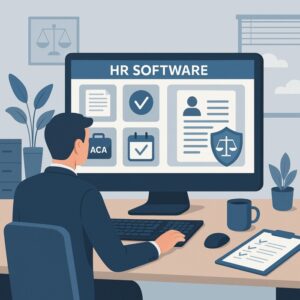For today’s small and midsize business owners, navigating the maze of employment law is one of the most complex—and critical—responsibilities. Federal, state, and local regulations are constantly shifting, and staying compliant requires more than just good intentions. Failure to follow employment laws can result in costly lawsuits, fines, and reputational damage.
Thankfully, HR software has evolved to do more than just process payroll. These tools now serve as compliance companions, helping businesses manage everything from onboarding and time tracking to tax filings and benefits administration. At Nitkin Law, we work with business owners every day who are integrating these tools into their operations. Here’s what you need to know about how HR software supports compliance—and where legal guidance still plays a crucial role.
The High Stakes of Employment Law Compliance
Employment law spans a broad spectrum, covering worker classification, wages, anti-discrimination, leave policies, employee benefits, and more. For employers, this means ensuring:
- Workers are classified correctly (employee vs. contractor).
- Payroll and overtime are calculated accurately under the Fair Labor Standards Act (FLSA).
- Policies align with the Family and Medical Leave Act (FMLA), Americans with Disabilities Act (ADA), and similar laws.
- Records are kept in line with federal and state mandates.
- All employees receive the necessary legal disclosures and documentation.
With regulations varying not only by state but often by city, keeping up with compliance is a daunting task, especially for companies without a dedicated HR or legal department.
How HR Software Assists with Legal Compliance
Modern HR platforms can drastically reduce the risk of compliance violations. While these tools do not replace the need for legal counsel, they can support day-to-day tasks that are critical to staying compliant. Here’s how:
Payroll Automation and Tax Management
One of the most common compliance pitfalls for businesses is inaccurate payroll. HR software helps ensure that wage calculations, tax withholdings, and filings are performed accurately and on time. Many platforms even offer automated payroll runs and direct integration with federal and state tax systems.
Support for Proper Worker Classification
Worker misclassification is a major legal risk. HR tools often prompt users to categorize workers accurately during onboarding, reducing the likelihood of misclassifying a contractor as an employee, or vice versa.
Time Tracking and Overtime Compliance
Maintaining accurate time records is critical for complying with wage and hour laws. Many platforms include time-tracking features that automatically log hours worked, breaks taken, and overtime accrued, ensuring employers follow FLSA requirements.
Digital Onboarding and Document Retention
HR software simplifies employee onboarding with digital I-9 verification, W-4s, and electronic acknowledgment of company policies. Storing these documents securely online helps businesses meet legal recordkeeping requirements and provides a clear paper trail in case of audits or disputes.
Benefits Management and ACA Reporting
Offering health benefits and retirement plans comes with its own set of regulations. HR platforms help employers stay on top of eligibility rules, enrollment deadlines, and Affordable Care Act (ACA) reporting obligations, reducing the administrative burden while keeping the business compliant.
Built-In Alerts and Policy Updates
Some HR systems even provide proactive alerts when regulations change or new compliance requirements arise. These updates allow businesses to make timely adjustments to policies and processes.
Where Legal Support Still Matters
While HR software handles many of the nuts and bolts of compliance, it doesn’t replace the nuanced advice and tailored solutions that a legal professional provides. Here’s where partnering with an employment law attorney is still essential:
- Policy Review and Development: Templates in software systems may be generic and not aligned with your specific state laws or industry. An attorney can draft or review policies to ensure they’re both compliant and customized.
- Dispute Management: In the event of a complaint, claim, or lawsuit, legal counsel is critical to navigating investigations, responses, and potential litigation.
- Interpretation of Ambiguous Laws: Software doesn’t interpret the gray areas. For instance, leave policies or termination decisions often require a legal perspective to avoid liability.
- Internal Audits and Risk Assessments: A legal professional can conduct audits of your classification, documentation, and policies to identify potential risks before they become costly problems.
At Nitkin Law, we routinely support business owners who are using HR technology to enhance their operations. Our goal is to help ensure that these tools work in harmony with sound legal practices, so your business runs smoothly and remains protected.
Stay Compliant, Stay Confident: Your Next Steps
Compliance doesn’t have to be overwhelming. HR software can streamline and simplify many of the processes involved in managing a workforce, but it should be seen as a complement to, not a replacement for, expert legal counsel.
If you’re using an HR platform or considering one to manage your workforce, it’s the perfect time to consult with a legal advisor. At Nitkin Law, we’re here to help you build HR systems that are not only efficient and scalable but also legally sound. Contact us to learn how we can help your business stay compliant and confident as you grow.


